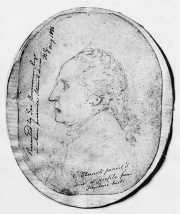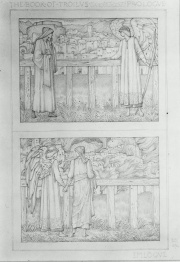Difference between revisions of "Graphite pencil"
| (2 intermediate revisions by 2 users not shown) | |||
| Line 1: | Line 1: | ||
| − | [[File:28.362-B4235.jpg|thumb| | + | [[File:28.362-B4235.jpg|thumb|Graphite pencil sketch<br>MFA# 28.362]] |
== Description == | == Description == | ||
| − | + | [[File:58.746-C42171.jpg|thumb|Preliminary illustrations<br>MFA# 58.746]] | |
Naturally occurring [[graphite]] was used as a writing tool in the 16th century. The soft greasy graphite produces dark, easily smeared lines. A graphite deposit was discovered in the Cumbrian Mountain region of England and mined for two centuries. Graphite was produced as small lumps of wadd, or black lead, for use in writing. In 1795, the procedure for preparing graphite with clay for use in pencils was developed concurrently by N. Conte (France) and J. Hardmuth (Austria). The graphite was mixed in a slurry with [[clay]] then extruded to form thin rods known as leads. These were fired at temperature of 1000-1100C then glued into shaped pieces of [[wood]] to form a [[pencil]]. The ratio of clay to graphite determines the hardness of the lead with an average hardness have a ratio of 2 parts graphite to one part clay. The common, though incorrect, use of 'lead' for the graphite point was a carry over term because lead points were previously used in drawing pencils. | Naturally occurring [[graphite]] was used as a writing tool in the 16th century. The soft greasy graphite produces dark, easily smeared lines. A graphite deposit was discovered in the Cumbrian Mountain region of England and mined for two centuries. Graphite was produced as small lumps of wadd, or black lead, for use in writing. In 1795, the procedure for preparing graphite with clay for use in pencils was developed concurrently by N. Conte (France) and J. Hardmuth (Austria). The graphite was mixed in a slurry with [[clay]] then extruded to form thin rods known as leads. These were fired at temperature of 1000-1100C then glued into shaped pieces of [[wood]] to form a [[pencil]]. The ratio of clay to graphite determines the hardness of the lead with an average hardness have a ratio of 2 parts graphite to one part clay. The common, though incorrect, use of 'lead' for the graphite point was a carry over term because lead points were previously used in drawing pencils. | ||
| − | |||
| − | |||
== Synonyms and Related Terms == | == Synonyms and Related Terms == | ||
| Line 10: | Line 8: | ||
lead pencil; charcoal pencil; wadd; black lead | lead pencil; charcoal pencil; wadd; black lead | ||
| − | == | + | ==Resources and Citations== |
| − | + | * Henry Petroski, ''The Pencil: A History of Design and Circumstance'', Alfred A. Knopf, New York, 1990. | |
* Ralph Mayer, ''A Dictionary of Art Terms and Techniques'', Harper and Row Publishers, New York, 1969 (also 1945 printing) | * Ralph Mayer, ''A Dictionary of Art Terms and Techniques'', Harper and Row Publishers, New York, 1969 (also 1945 printing) | ||
* Hermann Kuhn, ''Conservation and Restoration of Works of Art and Antiquities'', Butterworths, London, 1986 | * Hermann Kuhn, ''Conservation and Restoration of Works of Art and Antiquities'', Butterworths, London, 1986 | ||
| − | + | * James Watrous. ''The Craft of Old-Master Drawings'', University of Wisconsin Press, 1957. | |
[[Category:Materials database]] | [[Category:Materials database]] | ||
Latest revision as of 15:54, 3 August 2022
Description
Naturally occurring Graphite was used as a writing tool in the 16th century. The soft greasy graphite produces dark, easily smeared lines. A graphite deposit was discovered in the Cumbrian Mountain region of England and mined for two centuries. Graphite was produced as small lumps of wadd, or black lead, for use in writing. In 1795, the procedure for preparing graphite with clay for use in pencils was developed concurrently by N. Conte (France) and J. Hardmuth (Austria). The graphite was mixed in a slurry with Clay then extruded to form thin rods known as leads. These were fired at temperature of 1000-1100C then glued into shaped pieces of Wood to form a Pencil. The ratio of clay to graphite determines the hardness of the lead with an average hardness have a ratio of 2 parts graphite to one part clay. The common, though incorrect, use of 'lead' for the graphite point was a carry over term because lead points were previously used in drawing pencils.
Synonyms and Related Terms
lead pencil; charcoal pencil; wadd; black lead
Resources and Citations
- Henry Petroski, The Pencil: A History of Design and Circumstance, Alfred A. Knopf, New York, 1990.
- Ralph Mayer, A Dictionary of Art Terms and Techniques, Harper and Row Publishers, New York, 1969 (also 1945 printing)
- Hermann Kuhn, Conservation and Restoration of Works of Art and Antiquities, Butterworths, London, 1986
- James Watrous. The Craft of Old-Master Drawings, University of Wisconsin Press, 1957.

